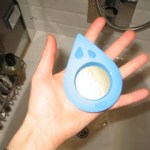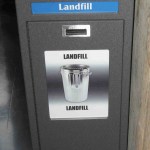Will Big Business Save the Earth? This was the title of the New York Times Op-Ed last week by Jared Diamond (UCLA professor and author of Guns, Germs, and Steel and Collapse). I thought we could go through his piece -- piece by piece.
1) He begins:
There is a widespread view, particularly among environmentalists and liberals, that big businesses are environmentally destructive, greedy, evil and driven by short-term profits. I know -- because I used to share that view. But today I have more nuanced feelings.
More nuanced feelings? The New York TImes must not edit for arrogance. Many big…
Consumed
Many of us are aware we have an impact on the planet but, as we know, there is a push to become aware with greater precision. One tool for this is the waterdrop, a shower meter marketed in Britain. Here is the blurb about it at the Ethical Superstore:
Statistics suggest that showering accounts for around one third of the total water used in the home. With each person in the UK using around 150 litres of water a day, this brings into question the accepted notion that showering uses less water than having a bath.
The Eco Showerdrop Shower Meter is an ingenious yet simple device designed to…
My mother uses Lancome for skin and make-up. I use Lancome. I sense Lancome knows that brand inheritance helps build brand loyalty. They also make very nice products, which helps. But Lancome is about to lose me as a customer.
I decided to order a few things online last week and they arrived yesterday. Products that weigh less than a pound packaged in glass, packaged in plastic, packaged in a fancy box, in a plastic bag, in another box, wrapped in paper and sent in a moving box. I actually blushed when I picked it up at the post office.
This mountain of packaging in an era of over-…
Recently, whenever I go to Starbucks, I see these tall reusable plastic cups for sale that look exactly like the the usual plastic cups (the ones people presumably feel guilty about) that cold drinks come in. Except they are bigger, fatter, reusable, and for sale. This product seems inane because the eco-friendliness is in no way conspicuous (we've come across this before) and, furthermore, you're still drinking out of and using plastic. Can someone explain?
Remember when food was just food? I don't. But I try to imagine it sometimes. I grew up in the throes of fast food, Halloween candy, and plates of bacon at breakfast buffets only to learn that I was just another victim of the food processing industry. Food issues are fascinating if for no other reason that they instill a constant sense of humility.
It took me traveling to South America to realize that popcorn could be made on a stove rather than in a moist microwaveable package. It's all very embarrassing.
But I am a human and his highly engineered crappy food is designed to appeal to…
Oliver Morton wrote a delightful book all about photosynthesis called Eating the Sun: How Plants Power the Planet, which I reviewed earlier this year for Search Magazine (R.I.P.) under the title "A Song for the Heartless". One of my favorite passages in the book beautifully explains the difference between art and science:
Discoveries feel determined. They are there to be made, and if one person doesn't, another will. This doesn't lessen the achievement; indeed it can give it spice. The thought that 'this is the way the world is--and I am the first to see it as such' is an intoxicating…
This is a new trash can in the Environmental Sciences building at Western Washington University. I like the "landfill" label.
In NewScientist today, there is a little article that describes the different types of carbon offsets you can purchase. It's not too informative and I much prefer articles with a little more of a critical eye, such as this 2007 piece in BusinessWeek or this piece from the NYTimes blog on confusing carbon labels. (By the way, be sure to check out the UK offset parody Cheat Neutral).
Truth is, I have been bored by carbon offsets for ages (ever since I did my master's related to carbon trading--back in 2002, when they were still calling it 'carbon sequestration' and the concept had not yet…
The test is simple: read this sign (recently photographed at my local Vancouver market, which is owned by Whole Foods) then gauge your response...
It seems people prefer flaunting their greenness to hiding it. If that's true, then companies should make their eco-friendly products distinguishable from their conventional (earth destroying) ones.
In their book Nudge, authors Thaler and Sunstein point out that part of the reason for the Toyota Prius' success over other hybrids is that the model is exclusively a hybrid. "People who want to signal their green credentials are much happier in a Prius than a hybrid Camry because no one will know the Camry is a hybrid." Ditto for Ford Escape or the Honda Civic, which also both come in hybrids…
Last month, Wal-Mart announced its plan to role out a sustainability index: a measure of how green its products are using a 15-question questionnaire (see the questions after the jump). You know that if the same store where a shrieking mob of holiday shoppers trampled an employee to death is talking this seriously about sustainability, then 1) we must really be in a pickle and 2) we must really be on the lookout for extreme greenwashing. Is Wal-Mart looking to improve its reputation? If so, is it doing so through deceptive or legitimate commitments? How can it reconcile profit with…
Cash for clunkers isn't leading to fewer carbon emissions--at least not in Germany.The New York Times reports today on the 50,000 cars (at least) in Germany that have been traded in for cash rebates to put toward new vehicles with lower emissions. The only problem is that those cars are making their way to Africa and Eastern Europe through an organized crime network (although by the sounds of the few safeguards in place to prevent this behavior, one can imagine that the system is not that organized). Congress recently extended the U.S. program that also offers rebates of $3,500 to $4,500…
The good news: I successfully defended my Ph.D. dissertation last Thursday. The bad news: I have not blogged for over a week now. My apologies for the long hiatus but please watch for new material very soon...
As a way of counteracting some of the work by Environmental Working Group, the Sea Turtle Restoration Project, and Oceana to inform consumers about the health risks of consuming too much seafood, a new website was just launched called HowMuchFish.com, which tells you how much mercury-laden tuna, salmon, and shrimp you can 'safely' consume.
Although it might not be obvious at first glance, HowMuchFish.com is sponsored by the Center for Consumer Freedom -- "a nonprofit coalition of restaurants, food companies, and consumers working together to promote personal responsibility". Check out their…
McDonald's launched this ad for for their Filet-O-Fish sandwich this year (just in time for Lent). Their marketing strategy is an interesting one: a rare reminder that the fish you're eating comes from an animal that was once alive.
What if it were you hanging up on this wall?
If it were you in that sandwich, you wouldn't be laughing at all.
Because food issues are "one of the most interesting social movements afoot right now", I thought I would continue the discussion over whether we should give up eating seafood just a bit longer and point out the recent post at Animal Planet asking if we should boycott seafood altogether? Why is giving up seafood so unpalatable (other than for the obvious reason that some people find it delicious)? I am sure some people would find manatee meat tasty, too. Does that mean we should eat them to extinction?
Today (which, as happenstance would have it, also happens to be World Ocean Day) the environmental and conservation news site Mongabay.com ran an interview with me on why we should stop eating seafood. I think that if we can get people to feel about fish the way they feel about birds it should be easier to save them...
In some ways, [fish] are not that different from birds and, as anyone who has ever been to England knows, there is no shortage of sentiment for avian species. Fish often travel in flocks and flash beautiful colors. Like the albatross, tunas cover remarkable migratory distances…
A blogpost over at GOOD magazine* reviews a new book on veganism, applauds the book for its flexible approach, and says we should "give up trying to guilt people into not eating any meat." The post mentions the environmental impacts of meat, which are indeed significant (according the the UN, rearing cattle produces more greenhouse gases than driving cars), but does not venture much further in the realm of why there is a guilt campaign around meat eating (which, I would argue, has been a fairly weak campaign -- the potential for gruesomeness hardly fulfilled at all).
If it is not yet clear…
The New York Times ran a great little profile on a great little video released in 2007 called The Story of Stuff. This 20-minute film created by former Greenpeace employee Annie Leonard has made its way around the globe and into many classrooms, where its animation and succinctness encourages discussion. And guilt.
According to the New York Times article, Rafael de la Torre Batker, age 9, was riding in the car one day with his parents in Tacoma, Wash., and wondered whether it would be bad for the planet if he got a new set of Legos.
Some parents are not pleased with the film, though. One…





